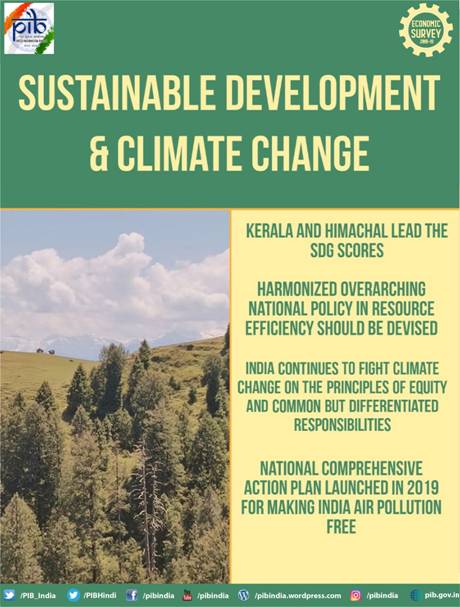India follows a holistic approach towards its 2030 Sustainable Development Goals (SDGs)
The Union Minister for Finance and Corporate Affairs, Smt. Nirmala Sitharaman tabled the Economic Survey 2018-19 in the Parliament today. The Survey states that India continues to target and maintain its economic growth, by introducing and implementing various policies and measures relating to sustainable development, climate change, resource efficiency and air pollution.
The survey states that in adoption of 2030 global agenda, countries are moving forward for achieving a world free from poverty, gender inequality and economic inequality and thereby ensuring a healthy planet for future generations. These goals are multi-dimensional and integrate various social, economic and environmental dimensions.
India follows a holistic approach towards its 2030 Sustainable Development Goals (SDGs) by launching various schemes. India's SDG Index Score ranges between 42 and 69 for States and between 57and 68 for UTs. Kerala and Himachal Pradesh are the front runners amongst all the States with a score of 69, Chandigarh and Puducherry are the front runners with a score of 68 and 65 respectively among the UT's, the Survey states.
Policy Initiatives for Sustainable Development
The Survey cites current Government of India policies in direction of achieving SDGs. These include Swachh Bharat mission, Beti Bacho Beti Padhao, Pradhan Mantri AwasYojana, Smart Cities, Pradhan Mantri Jan Dhan Yojana, Deen Dayal Upadhyay Gram Jyoti Yojana and Pradhan Mantri UjjwalaYojana, among others.
The Namami Gange Mission- a key policy priority towards achieving the SDG 6 - was launched as a priority programme with a budget outlay of Rs.20,000 crores for the period 2015-2020. Major components include sewerage project management, urban and rural sanitation, tackling industrial pollution, water use efficiency and quality improvement, ecosystem conservation and Clean Ganga Fund, among others.

Further, in order to address the increasing air pollution across the country in a comprehensive manner, Government of India has launched a National Clean Air Programme in 2019 as a pan India time bound national level strategy for prevention, control and abatement of air pollution besides augmenting the air quality monitoring network across the country.
The Survey states that a harmonized overarching National Policy on Resource Efficiency (RE), building upon the existing policies to address multiple sectors should be devised for mainstreaming Resource Efficiency approach in the development pathway for achieving SDGs. Resource Efficiency can be a major tool to meet the resource needs of the country, at the least possible cost to the environment, the Survey adds.
The survey assesses priority sectors of Indian economy for enhancing RE in India. It quotes IGEP, 2013 and states, "Various studies have analyzed the economic impact of RE strategy and identified that Rs. 6000 crores can be saved in the manufacturing sector with its implementation."
Principles of Equity and Common but Differentiated Responsibilities and Respective Capabilities
The Survey notes that India has continuously demonstrated its responsibility towards implementing climate actions on the basis of the principles of equity and common but differentiated responsibilities.
Quoting Prime Minister, Shri Narendra Modi, the Survey states, "You know that India is one sixth of the global community. Our development needs are enormous... People in India have waited too long for access to modern amenities and means of development. We have committed to complete this task sooner than anticipated. However, we have also said that we will do all this in a cleaner and greener way."
India's positive engagement at COP 24 negotiations in Katowice, Poland in 2018 resulted in protection of key interests, including recognition of different starting points for developed and developing countries; flexibilities for developing countries and consideration of principles including equity and common but differentiated responsibilities and respective capabilities.
Climate Finance and India's Nationally Determined Contribution
The Survey notes that the Paris Agreement emphasizes the role of climate finance in strengthening the global response to climate change. Though the international community witnessed various claims by developed countries about climate finance flows, the actual amount of flows is far from these claims. The Survey quotes UNCTAD, 2014 report and states that there is a shortfall of US$2.5 trillion per year in current investments in developing countries for achieving SDGs.
As per the Survey, concerted global efforts are required to address the climate challenges along with other developmental imperatives. Implementing India’s Nationally Determined Contributions requires investments of scale and size which is unprecedented. This essentially means that along with domestic public budgets, international public finance and private sector resources would have to be mobilized from a variety of sources.
Talking about the developments in Sustainable Finance arena, the Survey states that India stands at 11th position in global country ranking and accounts for 33% of the Certified Climate Bonds by number in emerging markets.
The developing countries like India will endeavour to do the best possible within their own domestic resources, keeping in mind the sustainable development imperatives. It is time for the global community to exhibit the requisite momentum to act upon their responsibilities on establishing the enabling environment for climate action, the Survey adds.
*****
DSM/RM/KSP/VM